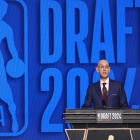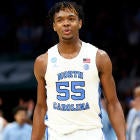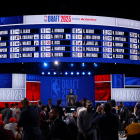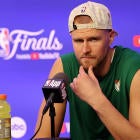
When Giannis Antetokounmpo was asked who he thought the best basketball player in the world was before the 2022-23 season, he didn't hesitate in picking Stephen Curry. The choice came down to a very simple rule. "The guy who wins is the best," Antetokounmpo claimed.
That is a rule that basketball fans have more or less abided by for the majority of NBA history. It's not always as simple as picking the last Finals MVP, but broadly speaking, most of NBA history has included a widely-agreed upon alpha winning multiple championships in a relatively short stretch. Most of the time it's a pretty simple matter to point to Michael Jordan or LeBron James as they're ripping off titles and say "Yeah, he's the best," no matter what the flavor of the month is doing to oppose him.
But Antetokounmpo's opinion on Curry is a fascinating insight into the concept of the best basketball player in the world, because only one year earlier, his own rule would have anointed him as the top dog.
In 2021, Antetokounmpo led the Milwaukee Bucks to their first NBA championship in over 50 years by averaging roughly 30 points and 13 rebounds across four dominant rounds. He scored 50 points in the championship closeout game over the Phoenix Suns. This is standard "best player in the world" stuff.
So, did Giannis get worse a year later when Curry grabbed the metaphorical belt? No. If anything, he was better. Despite the absence of Khris Middleton, Antetokounmpo dragged the Bucks to a Game 7 against the eventual Eastern Conference champion Boston Celtics by averaging a preposterous 33.9 points, 14.7 rebounds and 7.1 assists in a legendary second round matchup. It wasn't enough not because of any failure of his own, but because his best teammate was hurt. The stars aligned for Curry. They didn't for Antetokounmpo. So the belt changed hands.
We've had five different champions across the last five seasons, and some version of this story has played out across each of them. Kevin Durant was playing the best basketball of his career in the 2018 playoffs before an injury ruined his run at a third straight title. Kawhi Leonard and the Raptors swooped in, and the belt belonged to him. One year later, COVID-19 changed the face of the season, and Leonard's Clippers were humiliated in the bubble. James and the Lakers won it all, delivering the belt back to him. Injuries to James and star teammate Anthony Davis (along with a host of other stars leaguewide) opened the door for Antetokounmpo and the Bucks in 2021. Middleton's injury may well have won the Warriors the 2022 title. After missing two playoff runs, Jamal Murray returned healthy in 2023, allowing Nikola Jokic and the Nuggets to run roughshod over a playoff path that featured three Play-In Tournament teams.
Does each new season really have a new best player? Or does the "guy who wins" criteria not leave enough room for nuance, because the guy who wins is almost always the guy who benefits the most from circumstances outside of his control.
This brings us to Luka Doncic, the current contender for the best-in-the-world belt who deserves to be in that conversation whether or not he winds up being the guy who wins. He has, to this point, checked every other box. He was the league's leading scorer this season. His defense has improved meaningfully from outright bad to passable and even good in the right contexts. His pick-and-roll mastery has reached historic levels. Minnesota threw every conceivable coverage at him in the Western Conference finals. He solved them all within a few possessions. He's been the best lob passer in NBA history for years now. The only thing he hasn't done yet is actually win the championship. That may change in the coming weeks.
Should that change our opinion of him as a player? It's worth remembering that, at least statistically, this has been Doncic's worst postseason. He's averaging 28.8 points per game this postseason. That's a ton by anyone else's standards... but he'd never averaged fewer than 31 in any of his three previous playoff appearances. His field goal percentage (43.8%) and 3-point percentage (34.3%) are also playoff lows.
That in itself says practically nothing about how well Doncic has played. Remember, he's playing through multiple leg injuries at the moment, and he's faced two top-five defenses in three series. But it's worth remembering here that, for the most part, Doncic was already this good. He's improved in a few small but important ways this season, but it would be hard to say that he, personally, is playing at a level that he's never reached before.
The reverse is probably true of some of those other belt holders. Leonard, James and Curry have aged out of true contention for this title, but are Jokic or Antetokounmpo worse today than they were when they won it all? There really isn't much evidence suggesting that they are. Antetokounmpo just became the first player in NBA history to average 30 points on 60% shooting. Jokic, the analytical darling of the trio, posted career-best numbers in multiple advanced metrics, including Win Shares (17) and VORP (10.6).
Entering the postseason, you could have made reasonable cases that any of the three were the best player in the world. Doncic shoulders the biggest individual offensive load. Neither Jokic nor Antetokounmpo operate within the same sort of heliocentric offense that Doncic does. If the Mavericks ultimately win the championship, Doncic would become the first NBA champion to ever finish among the top 20 players in single-season usage rate in league history. Or the top 30. Or the top 40.
Champions rarely carry the burden that he does. Jokic doesn't statistically, but his value is a bit more holistic. His passing empowers teammates in ways not even Doncic can match. Doncic racks up assists by creating specific, high-value shots for teammates. Jokic does so by weaponizing every Nugget everywhere on the floor. Practically every shot Denver takes is a good one because Jokic makes it so. He doesn't score as much as Doncic, but he scores more efficiently. Both are valuable albeit flawed defenders. Antetokounmpo has won Defensive Player of the Year, and even if he hasn't quite played at that level lately, he's still far and away the best two-way player of the group.
The playoffs arrived and, well, you know the story. Milwaukee was bounced quickly without the injured Antetokounmpo. Denver went 15 rounds with a Timberwolves team designed to beat it, not the Mavericks, and fell in a Game 7 collapse as Murray fought through a calf injury.
This isn't to take anything away from Doncic or the Mavericks, who fought through a brutal path to reach the Finals and have an even tougher foe awaiting them there. But they also got a huge break in the first round when Kawhi Leonard could barely suit up for the Clippers. Additionally, they also landed two ideal role players at the trade deadline in P.J. Washington and Daniel Gafford who went on to vastly improve upon their previous performances for lesser teams (likely in part because they got to play with Doncic).
Dallas also landed a star rookie center with the No. 12 pick in the draft in Dereck Lively. Heck, his sidekick, Kyrie Irving, was available for a far cheaper price on the trade market than he should have been because of a series of off-court issues that would be impossible for another player to replicate without another pandemic. Doncic's job was to maximize the cards that he was dealt. It's just hard to deny that he got a strong hand. Just as the circumstances aligned for Jokic last season or Antetokounmpo in 2021, they have for Doncic this season.
This is the inherent flaw in the "guy who wins" standard, and it's only compounded by the parity that has become the NBA's new baseline. We are about to crown our sixth champion in six years. Has the best player belt changed hands that many times? Superstar injuries are becoming more and more common in the postseason. Player movement, particularly through trades, is at an all-time high. The new collective bargaining agreement is designed to break up champions before dynasties can form.
Dallas may face that reality as soon as this offseason. The Mavericks signed key defensive wing Derrick Jones Jr. to a minimum-salary deal last offseason. He stands to earn far more this offseason. Dallas would need to open up the full mid-level exception to make a competitive offer. Doing so would mean finding ways to shed salary elsewhere.
Even if Dallas brings back this roster next season, who's to say it won't be the contender that catches the injury bug next spring. Maybe, just as Minnesota sprouted up as Denver's kryptonite, some younger team emerges as the same sort of threat to the Mavericks. These maybes add up. Dallas will be right back in the thick of next year's Western Conference race, but like any contender, it has far more paths to defeat than victory. That's just the reality of the modern NBA. Nobody is supposed to be the guy who wins for a long time.
Of course, neither Jordan nor James were supposed to be the guy who wins for as long as they were, either. Even if the league was more welcoming to dynasties during their peaks, James and Jordan clung to their best-in-the-world status for so long, largely because they deserved to. They are, by almost any estimation, the two greatest basketball players that have ever lived.
It is unlikely, but conceivable, that a modern player could reach that level of excellence even with all of the new barriers the league has erected. There's still time for Doncic, Jokic or Antetokounmpo to rise up to that level of undisputed superiority. The fact that none of them has done so yet suggests that the likeliest outcome for the three of them will be trading "guy who wins" bragging rights amongst each other for the next couple of years before they age out of the race. The mere fact that the title keeps changing hands this much indicates that none of them will ever grip it as tightly as James or Jordan did.
This is where we should probably address the 7-foot-4 elephant in the room, because there is a possible undisputed No. 1 waiting in the wings. Victor Wembanyama entered the NBA as the greatest draft prospect the league had ever seen. He exceeded those expectations as a rookie. He plays for a team that has stockpiled draft picks and cap space expecting a prolonged run of contention. He might have the greatest coach of all time.
If ever there was a player designed to test the forces working against a James- or Jordan-esque run atop the league, it would be Wembanyama. Even as Doncic, Jokic and Antetokounmpo jockey for position in the present, it's hard not to wonder if they might just be placeholder alphas, stopgaps while we wait for the Wembanyama era to officially begin.
For that to happen, he's going to have to eventually beat Doncic and Jokic and Antetokounmpo, because that's ultimately how the league tends to work. Fair or not, the guy who wins is almost always regarded as the NBA's best player. If Doncic wins four more games, he'll hold the unofficial belt. But if that's the only criteria we're using to award it, we're going to keep passing it around, year after year, because that's what the modern NBA is designed to force.


















